 Petzlover
Petzlover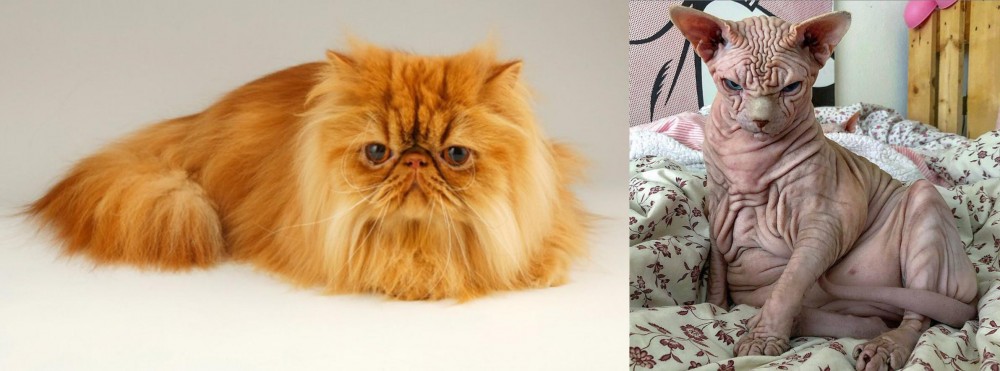 Persian is originated from Iran but Sphynx is originated from Canada. Both Persian and Sphynx are having almost same weight. Both Persian and Sphynx has almost same life span. Both Persian and Sphynx has same litter size. Both Persian and Sphynx requires Moderate Maintenance.
Persian is originated from Iran but Sphynx is originated from Canada. Both Persian and Sphynx are having almost same weight. Both Persian and Sphynx has almost same life span. Both Persian and Sphynx has same litter size. Both Persian and Sphynx requires Moderate Maintenance.
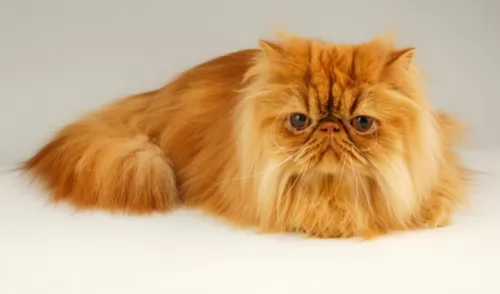 Cat lovers the world over know the Persian cat very well. It's a beautiful long-haired cat breed with its familiar round face and blunt muzzle.
Cat lovers the world over know the Persian cat very well. It's a beautiful long-haired cat breed with its familiar round face and blunt muzzle.
It is not really known when long-haired cats first appeared, or where the Persian originated but their history stems from Persia or Iran as it is known today, where it seems they were first sighted.
The cats were grey-coated and some were white and soon the cats arrived in Britain. They were introduced to the United States in the 1900s. The cat was developed first by the English, and then also by American breeders after the Second World War and the breeding of these cats has also meant a lot of coat colors.
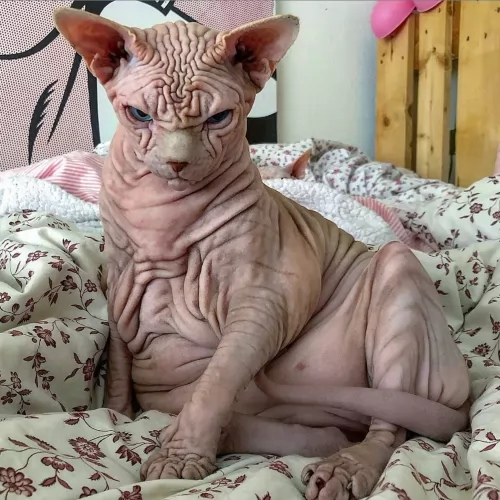 The Sphynx cat is well known for its hairlessness. This breed started its development in Toronto, Canada.
The Sphynx cat is well known for its hairlessness. This breed started its development in Toronto, Canada.
A hairless kitten was born and it was mated to produce more hairless kittens. These kittens were called Canadian Hairless Cats. They were used as the foundation for a new breed.
In the 1970s, more hairless kittens were born and placed into the Sphynx breeding program. They were mated with Devon Rex cats. The International Cat Association recognizes this cat breed.
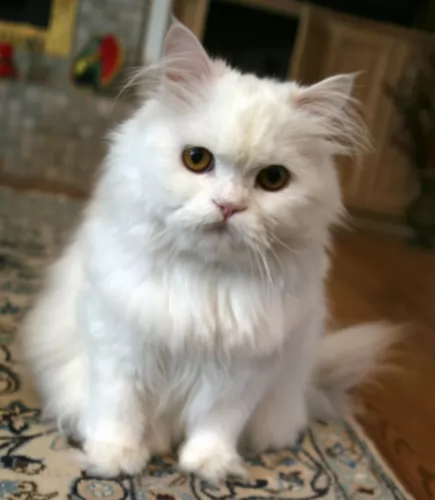 The Persian cat is a medium- to large-sized cat and is heavily boned. He can weigh between 3 and 6kg.
The Persian cat is a medium- to large-sized cat and is heavily boned. He can weigh between 3 and 6kg.
He has stocky legs, a thick neck, small ears, round head, round eyes, and the face is flat or blunt. The kittens are gorgeous balls of fluff.
The coat of the Persian is thick, long, and silky. People many times think only of a white Persian, when in fact the cat comes in many colors and patterns. Eye color for the cat can be blue, green, brown, copper or even odd-eyed.
The Persian isn’t the most active of cats, so attention will need to be given to exercising the cat so as to manage his weight. This cat will also need to have his nutrition controlled to stay in shape and in good health.
Persians enjoy games with their human family and will need some toys to encourage play and exercise.
He is placid and calm but that doesn’t mean he can’t have bursts of energy. They’re quieter than other cats, are sweet-natured, preferring to live in quieter, less boisterous households.
They aren’t loudly vocal but communicate with their eyes and their soft voices. They won’t get on well with small, noisy children but can be loving pets and companions of older children who allow them their own space.
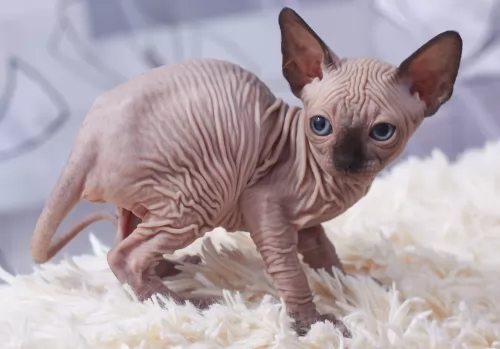 The Sphynx is a medium-sized, fine-boned, muscular cat that weighs roughly between 3.5 – 7 kg. The skin of the cat has a soft chamois type feel to it.
The Sphynx is a medium-sized, fine-boned, muscular cat that weighs roughly between 3.5 – 7 kg. The skin of the cat has a soft chamois type feel to it.
Sometimes there can be a few hairs. The head of this cat is longer and narrower than many of the other cat breeds. The ears are large.
This cat is going to need a bath once a week with special medicated cat shampoo. The cat also has no whiskers or eyelashes. The legs are long and slender and he has a barrel chest. All skin patterns and colors are available with the cat.
The Sphynx is a loving, friendly, energetic, extrovert cat that loves nothing more than to be petted and pampered.
It one of the few dependent cats there are. Even though he is social, he isn’t very vocal. They are playful too and because they are also intelligent, they will need stimulating games and toys to keep them from becoming bored.
They get on well with children in the home. Like many other cats, the Sphynx cat can be doglike and they like to welcome their owners home.
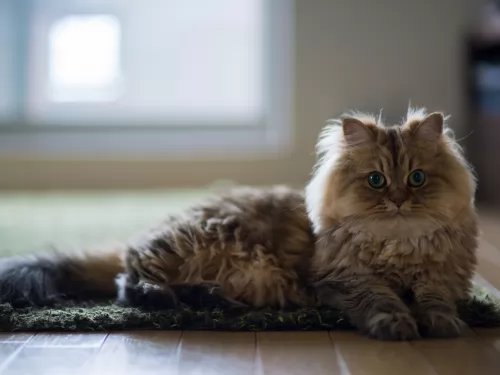 The amicable personality of the Persian cat makes it easy to have these cats in your home. The long hair becomes a bit of an issue as the cat sheds quite a bit.
The amicable personality of the Persian cat makes it easy to have these cats in your home. The long hair becomes a bit of an issue as the cat sheds quite a bit.
They’re sweet, quiet cats and they don’t demand attention from you. They are more than happy just lying quietly in a warm spot. They are calm, loving cats and it's no wonder that they are still such a popular breed of cat.
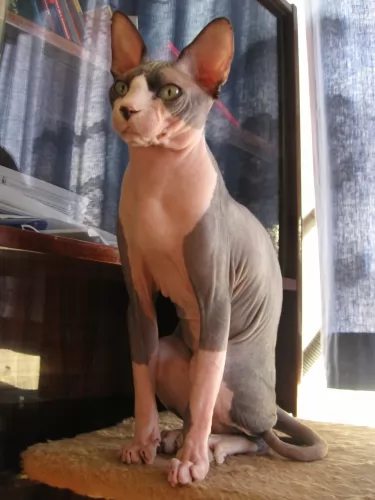 The Sphynx can be in a house where there are children who have been taught to be kind and gentle with animals.
The Sphynx can be in a house where there are children who have been taught to be kind and gentle with animals.
The cat is energetic and loves to entertain and amuse his human family with his antics.
He is loving and loyal to his human family and absolutely hates staying on his own. He can actually get depressed when he is left on his own often.
He would be far better off with another cat companion. If you're looking for a fun, playul, loving and affectionate feline companion, you need look no further than the weird-looking sphynx cat.
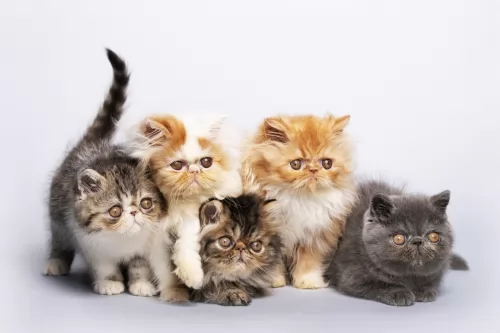 The structure of this cat’s head can mean some health problems. Hereditary Polycystic kidney disease is prevalent with the Persian cat. It is an inherited condition that causes cysts to form in the kidneys. These cysts are actually present from birth, growing larger over time and interfering with kidney function and ending in kidney failure.
The structure of this cat’s head can mean some health problems. Hereditary Polycystic kidney disease is prevalent with the Persian cat. It is an inherited condition that causes cysts to form in the kidneys. These cysts are actually present from birth, growing larger over time and interfering with kidney function and ending in kidney failure.
Also, with a larger breed cat such as the Persian, hip dysplasia is a problem.
Persians are also susceptible to malocclusion which means ‘incorrect bite’. This particular condition can affect the cat’s ability to grasp and actually hold food. So much so in fact, that now pet food manufacturing companies have even developed specially-shaped kibble to cater particularly for the Persian.
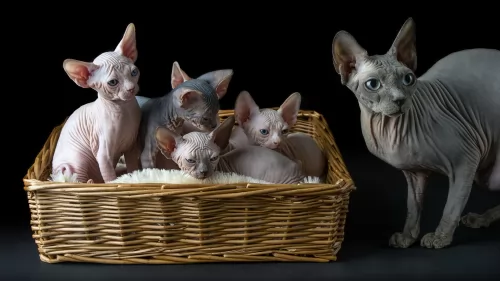 The Canadian Sphynx, just because of its lack of hair, already faces challenges. Other cats have fur to keep them warm and to protect the skin from sunlight.
The Canadian Sphynx, just because of its lack of hair, already faces challenges. Other cats have fur to keep them warm and to protect the skin from sunlight.
In fact, when the kittens are born, without hair, they are vulnerable and become prone to respiratory infections. Reputable breeders, therefore, only allow their kittens to go to new homes when they are at least 14 weeks of age.
This cat is also prone to skin problems and this could include rashes and fungal infections. As with any other cat, the Sphynx cat requires protection from harmful cat diseases by being vaccinated.
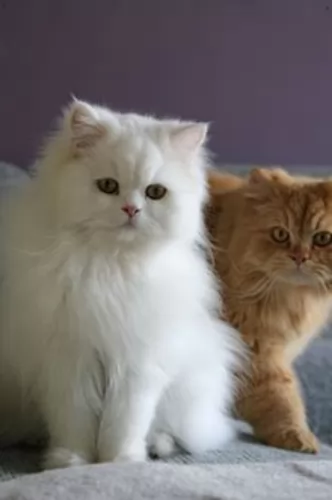 The Persian cat’s coat is long and silky and because he is a fairly heavy shedder, he will require regular brushing – certainly once or twice a week to get rid of that loose hair. It is important to brush and also cut the hair so as to get rid of the tangled knots that form.
The Persian cat’s coat is long and silky and because he is a fairly heavy shedder, he will require regular brushing – certainly once or twice a week to get rid of that loose hair. It is important to brush and also cut the hair so as to get rid of the tangled knots that form.
While brushing your Persian, make sure that his eyes and nose are clear. This is important because the flat face creates problems with these cats.
Excellent cat food for your Persian involves reading labels and understanding what brands are best for your beautiful cat. The Persian cat is a carnivore and will require high-quality food rich in protein.
Speak to your vet if you are in any doubt about the best food for your cat’s health and wellbeing. Make sure your pet has a constant supply of fresh, cool water.
Make sure to keep the litter box clean. Buy a small rake from the pet shop and rake up your cat's feces every single day and dispose of them.
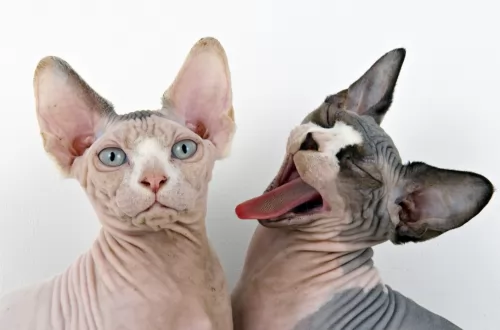 Even though the Sphynx cat is hairless, he isn’t to be regarded as a low maintenance cat. First of all, the sheer lack of hair means he is more vulnerable to the sun and to the cold. If he goes outdoors, you have to be careful that his skin doesn’t get burned.
Even though the Sphynx cat is hairless, he isn’t to be regarded as a low maintenance cat. First of all, the sheer lack of hair means he is more vulnerable to the sun and to the cold. If he goes outdoors, you have to be careful that his skin doesn’t get burned.
These cats also have more ear wax than other cats as they don’t have hair in their ears. Dirt, wax, and oils can accumulate in the ears. They will need to be cleaned regularly, and a vet or the pet groomer can help you with this.
The Sphynx cat also collects oil and dirt under their nails, so just like the ears, the nails as well as the surrounding skin folds will need to be properly cleaned. Cat owners need to know that these hairless cats aren't as low maintenance as thought, but require quite a bit of grooming. Special grooming products are available for this cat.
What one cat likes to eat won’t be the same as another cat. The Sphynx, like every other cat, is a carnivore and he will need all the different nutrients from his food.
The best commercial cat food manufacturers know that the proportion of these nutrients will vary as the cat ages and goes through different stages of its life. Your cat needs the right meat foods and he needs the right quantity as well.